Top Psychologists for Relationship Counselling
This term “Relationship Counselling” is widely used these days whenever people face problems in their relationship or want to improve the quality of their relationship. Thus, getting help from a professional seems a great idea to resolve any indifference. It focuses on helping couples to address their issues in the relationship and work hard to solve them. It helps in improving communication styles, increasing understanding and develop empathetic behvaiour towards one another in the relationship.
Table of Contents
ToggleRelationship Counselling takes everything into consideration that makes individuals in the relationship argue, disagree and fight with each other or even end the relationship altogether. A Couple may also decide to take relationship counselling during the first stages of their relationship when they don’t know each other much and are struggling with each other in the relationship. But the main thing that should be clear is that now-a-days, relationship counselling is not only for those who are in a romantic relationship but also for other relationships like father-son, mother-daughter, siblings, etc. Conflicts can arise in any relationship so, counselling is important for every relationship that exists in a person’s life.

The counsellor effectively works with both individuals who came in the counselling session but also tries to understand both the individuals separately and gain a good understanding about them. So, that next level of intervention and exercise can be decided keeping in mind both of them and their needs as well. Ensuring that both the parties are satisfied mentally and are able to fulfill their expectations and goals in the counselling session is the ultimate goal of the relationship counsellor.
Signs that show Relationship Counselling is necessary in a relationship
Couples or individuals coming for relationship counselling in the session comes to address a variety of issues and wants to decrease the effects that they are suffering due to those issues in their relationship. So, couples or individuals may seek relationship counselling when:
- Amount of times arguments happen have increased
- Communication pattern has become poor
- Even normal conversation turns into an argument or a fight
- Dissatisfied sexual aspect of the relationship
- Feeling like trapped in the relationship
- Lack of common interests
- You both don’t share anything with each other
- Constant disputes on new topics everyday
- Infidelity
- Few cases of violence
- Financial disagreements
- Not able to handle or manage their extended families
- Issues with emotional intimacy
- Disagreement over wanting to have children

What is Relationship Counselling and how does it work?
In a relationship, individuals must have commitment and constant support to cope with ever changing situations and demands of the life. And also, they must work hard to fulfill the needs of companionship and ensuring psychological, social and emotional well-being of each other as a couple. But sometimes, couples or individuals fail to do so and thus require relationship counselling to save their relationship from drowning.
Relationship Counselling focuses on the existing problems in the relationship between the two people and those problems can be an individual symptom or a psychological problem or a relationship conflict. It is also referred to as couples counselling because mostly people who come for relationship counselling are couples only. But this approach is not only limited to married couples but also to unmarried couples and other unromantic relationships as well.
It is of course different from normal traditional way of counselling as it involves two individuals rather than only one in the counselling session. As the two individuals enter together in the counselling session, it is important for the counsellor to focus on both of them and understand their perspectives. For example, if one is constantly arguing with one’s spouse, one will probably be chronically anxious, angry or depressed (or all three). Or, if one has difficulty controlling one’s temper, one will have more arguments with one’s partner. So counsellor must put attention on their behaviours as well as their emotions.
In relationship counselling, the counsellor helps a couple to identify the conflict issues within their relationship, and helps create changes that are needed in the behaviour of each partner. These changes may include different ways of interacting with each other in the relationship, or they may be individual changes related to the personal psychological problems.
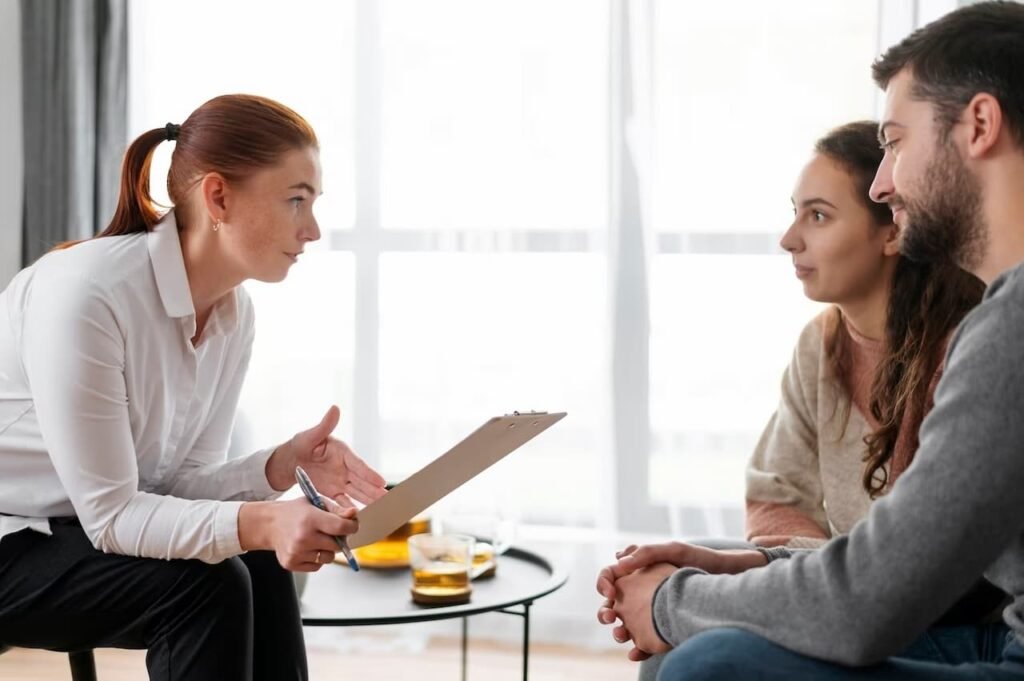
Firstly, worksheets and questionnaires are given so that the level of conflicts or problems and their impact can be measured which will act as a layout for deciding the course of the counselling. This exercise also reveals the perspectives or opinions that the two individuals might have regarding the relationship and for one another. Counsellor asks various questions in the beginning of every counselling session and the whole session revolves around those questions and the given answers.
For example, counsellor asks, “on which topic, the argument always happen?” and the answer could be “personal space” and then the whole session would be on how to provide personal space in the relationship. Counsellor helps the couples learn how to avoid competing with each other, and accept and fulfil the need to identify common life goals and how to share responsibilities within their relationship.
After the questionnaire and initial interview has been conducted while establishing rapport, more information is taken from the couple, how long the problem has been there, what steps they have taken to resolve it, what has worked and what has not worked, and if earlier counselling was helpful or not. Detailed history of the relationship is taken from the couple in a conjoint session where both share their perspectives and experiences in front of the counsellor. Then sometimes individual brief session is also taken after conjoint session to get a fuller picture of the current condition and to establish rapport. Then, intervention plan is decided and approach is finalized which will be used in the counselling session.
Here are some approaches to Relationship Counselling which are used in the counselling session and have various features and aims to fulfil in the counselling session:
1. Insight-oriented Relationship Counselling
Insight-oriented Relationship Counselling takes the work of Daniel and Meissner (1978) and in this, the counsellor aims to help the couple or individuals to become aware of themselves and thus reduce the misunderstandings and get in touch with their own feelings and as well as of their partner. In this, both the individuals are given an opportunity to express themselves and present their own feelings, opinions and thoughts to their partner with the support from the counsellor. This helps in liberating the person and freely resolves all the conflicts in the relationship.
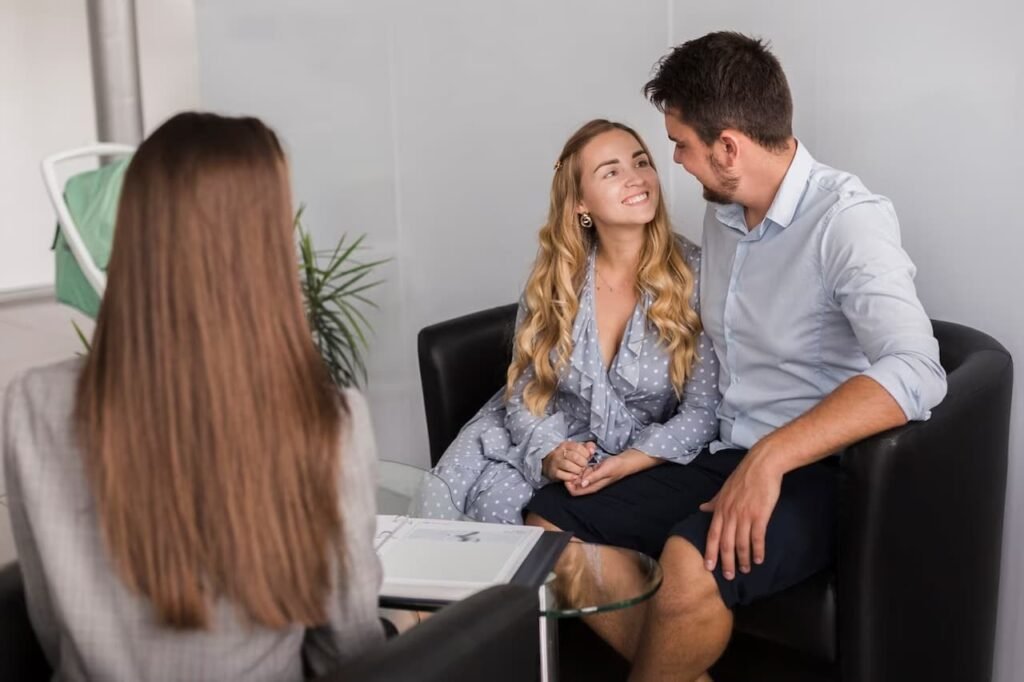
2. System Relationship Counselling
System Relationship Counselling is derived from the concepts by Minuchin and Haley when they worked with families. This approach is suitable when dealing with two individuals at once in the counselling session. The main point here is enmeshment, an excessive involvement of one person with other person. This happens when sexual, emotional, physical and intimate needs of one person is more than the other person and this causes conflicts so, the counsellor establishes homeostasis so that balance is maintained without any influence from external conditions. Couples or individuals are taught various strategies of how to fulfil their partner’s needs and make the relationship move forward smoothly.
3. Behavioural Relationship Counselling
Behavioural Relationship Counselling is highly structured and focuses on observable behaviour. In this, the counsellor uses a variety of behavioural therapy’s strategies like positive and negative reinforcement, positive and negative punishment and contingency contract and reciprocity negotiation in the counselling session to decrease the likelihood of unacceptable/ unwanted behaviours and increase the likelihood of acceptable/ wanted behaviours.
For example, the tendency to argue every time when disagreed is replaced by the behaviour of trying to understand the other person and accept the different opinion respectfully. In this, communication training is also provided so that the couple or individuals are motivated to communicate clearly, understand each other, listen to each other’s different opinions and also express themselves clearly. Along with this, problem-solving techniques are also taught to make the couple engage in negotiation talks, decision making and positive communication.
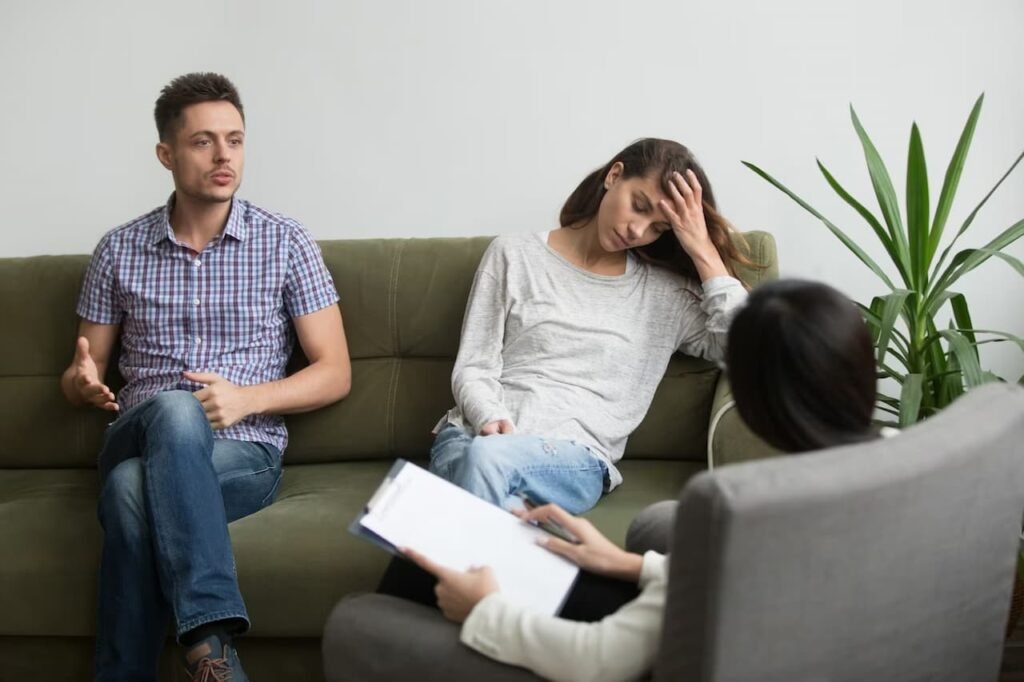
4. Cognitive Behavioural Relationship Counselling
Cognitive Behavioural Relationship Counselling is used when communication misunderstandings, generalizations and negative thinking patterns have to be identified. Irrational thinking patterns, negative emotions and illogical behaviours are replaced by the rational thinking, positive emotions and logical behaviours in the counselling session. Intentions behind any action are recognized and altered if necessary. This approach is proven to promote understanding and modify miscommunication.
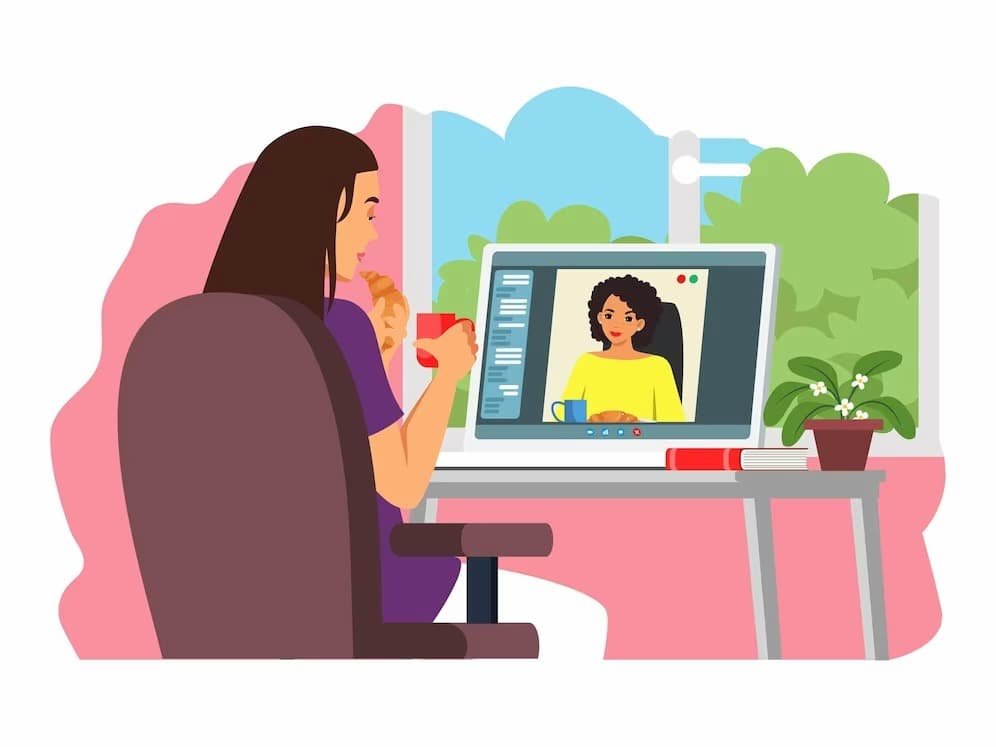
5. Emotionally Focused Relationship Counselling
Emotionally Focused Relationship Counselling aims to change problematic interaction styles and established emotional reactions to it. There are nine intervention steps in Emotionally Focused Relationship Counselling which helps the couples to become able to recognize their own emotional needs and change communication patterns if needed. With this approach, all the needs of the couple will be fulfilled and any destructive interaction pattern can be minimized. The Nine Steps of Emotionally Focused Relationship Counselling/ Couple Counselling are:
Step 1 – Assessment of the core issues that are causing conflict in the relationship
Step 2 – Identifying the problem interaction cycle that maintains insecurity and distress
Step 3 – Accessing the acknowledged emotions underlying disturbed communication patterns
Step 4 – Reframing the problem and the emotions
Step 5 – Identifying the needs and aspects of self and incorporating them in relationship interactions
Step 6 – Accepting partner’s new ways of behaving and responding
Step 7 – Expressing one’s own needs and wants and emotions as well as letting the partner to do the same
Step 8 – Facilitating the emergence of new solutions to old established problems
Step 9 – Consolidating new solutions to the behaviours
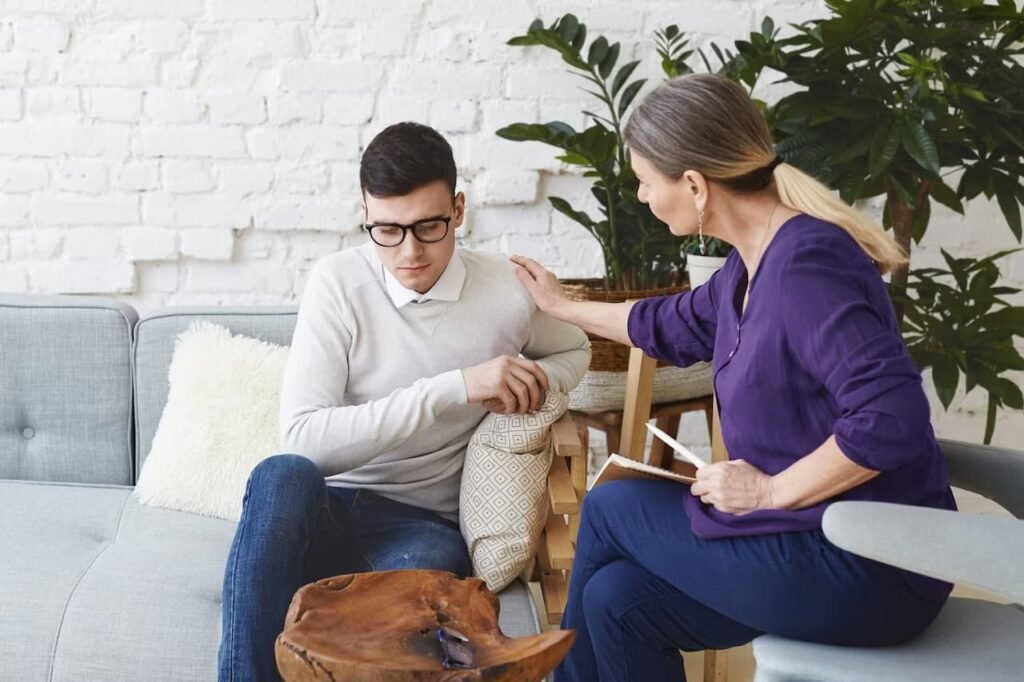
Some tips taught in Relationship Counselling
- Communicate with each other clearly.
- Forgive each other and forget about the past problems.
- Show each other that you are grateful for one another.
- Make each other your priority in life.
- Accept each other’s differences and work through it together.
- Give each other personal space.
- It’s okay to disagree sometimes but not okay to fight over it always.
- Spend quality time with each other.
- Always work on building each other’s trust.
- Accept each other’s differences and work on them together.
- Share everything with each other.
- Find common interests and plan your life accordingly.
- Show respect to each other always.
- Always always- Negotiation.
- Say “I love you” often
- Plan your goals together.
- Appreciate each other on important things.
Visit Medavas to seek Relationship Counselling from professionals
Putting a lot of efforts and hard work is important to keep a relationship strong and to maintain a commitment with each other but sometimes it fails. So, with the help of a professional like a relationship counsellor, the problems or conflicts in the relationship can be solved efficiently and quality of the relationship can be improved. At Medavas, various psychologists/counsellors are available who are specialized in this field of relationships, breakups, conflict resolution, etc. You can book your appointment anytime with them in any mode like instant messaging, audio calls or video calls and avail the benefits at our website called Medavas.

Frequently Asked Questions (FAQs) for Relationship Counselling
Is Relationship Counselling beneficial?
Yes, Relationship Counselling is beneficial as the counsellor can help the couple to decide about moving forward or putting efforts and staying in the relationship. With the help of the counsellor, couples can figure out ways to solve their problems and make their relationship work. The topmost benefit of relationship counselling is that people can express their feelings to each other.
What qualities a relationship counsellor must possess to give a counselling session?
A relationship counsellor must have good listening skills, patience, critical thinking, empathy, understanding behavior and non-judgmental behavior.
What is the primary goal of Imago Relationship Therapy?
The primary goal of Imago Relationship Therapy is that couples should workout misunderstandings by resolving conflicts and finding new ways to communicate effectively with each other. They should find a common ground and work with each other in cooperation.





















